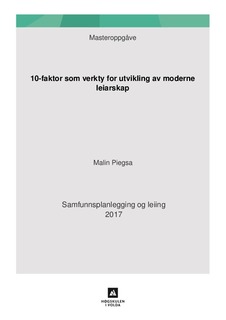| dc.contributor.author | Piegsa, Malin | |
| dc.date.accessioned | 2018-08-28T13:18:18Z | |
| dc.date.available | 2018-08-28T13:18:18Z | |
| dc.date.issued | 2017 | |
| dc.identifier.uri | http://hdl.handle.net/11250/2559690 | |
| dc.description.abstract | Norske kommunar står overfor store utfordringar for å kunne møte samfunnsendringane og tilby velferdstenester også i framtida. Kommunesektorens organisasjon (KS) bidreg på ulike måtar for å styrke kommunane i deira utviklingsarbeid. Eit utviklingsverkty som vart lansert i 2015, er medarbeidarundersøkinga 10-faktor. Problemstillinga for denne studien er «På kva måte opplever kommunale leiarar å ha utvikla sitt leiarskap som følgje av 10-faktor?». Resultata bygger på funn knytt til tre forskingsspørsmål som omhandlar kommunalt leiarskap, kva leiarane opplever å ha lært og korleis 10-faktor vart gjennomført i desse kommunane. Formålet med denne tverrsnittsstudien har vore å få forståing for leiarane sitt perspektiv på 10-faktor. Det empiriske materialet baserer seg på kvalitative semistrukturerte intervju med fire kommunale leiarar i to kommunar. Systematisk tekstkondensering vart brukt som framgangsmåte i analysen. Det teoretiske rammeverket for oppgåva er knytt til teori om samfunnsendringar, leiarskap, læring og utviklingsarbeid. Studien viser at informantane opplever at det å støtte og leie endring er grunnleggjande ved det kommunale leiarskapet, men at det er vanskeleg å prioritere utviklingsarbeid. Vidare meiner informantane at både sjølve undersøkinga og oppfølginga av 10-faktor har vore nyttig. Spesielt framheva dei nytten av å ta i bruk dialog som arbeidsmetode. Som følgje av 10-faktor seier leiarane at dei har tileigna seg ny kunnskap om medarbeidarane sine behov for meistring og relevant kompetanseutvikling. Samtidig ser det ikkje ut for at denne kunnskapen har påverka deira utøving av leiarskap i særleg stor grad. Døme på endringar som er gjort i etterkant av 10-faktor er måten ein gjennomfører felles samlingar og personalmøter på. Desse endringane er synlege i organisasjon, og 10-faktor kan dermed seiast å ha ført til organisasjonslæring. Det at 10-faktor ikkje har bidrege til større endringar kan forklarast med at det manglar eit system i kommunane for å gjere om individuell læring til organisasjonslæring. Studien bygger på eit lite utval informantar og ein kan ikkje trekke konklusjonar som gjeld 10-faktor og kommunale leiarar på eit generelt grunnlag. Samtidig er desse funna interessante då det er sannsynleg at andre kommunale leiarar står overfor dei same utfordringane. | nb_NO |
| dc.description.abstract | Summary
Norwegian municipalities are faced with considerable challenges concerning adjusting to societal changes and continuing to offer social services in the future. The Norwegian Association of Local and Regional Authorities (KS) contributes in various ways to strengthen municipalities in their developmental efforts. One of these developmental tools, which was launched in 2015, is the employee research «10-factors». The thesis of this study is ”In what ways do municipal leaders experience the development of their leadership abilities as a consequence of the ‘10-factors’?”. The results are based on the findings connected to three research questions regarding municipal leadershipskills, what leaders said they have learned, and how the «10-factors» was implemented in these municipalities. The purpose with this cross-sectional study has been to understand the leaders’ perspecitves on the «10-factors». The empirical material is based on qualitative semi-structured interviews with four municipal leaders in two municipalities. Systematic text condensing was used as method in the analysis. The theoretical framework for this study is connected to the theory of societal changes, leadership, learning and development. The study shows that the interviewees felt that supporting and leadership in the process of change is fundamental to municipal leadership, but they still find it difficult to prioritize developmental work. Furthermore, the interviewee’s opinions was that both the research and the follow up work of the “10-factors” was useful. In particular, they emphasized the usefulness of dialogue as a working method. As a result of the “10-factors” the leaders said that they had acquired new knowledge about their employees’ need for support enabling them to cope with daily challenges and their need for relevant competency. At the same time, it doesn’t appear as though this new knowledge has influenced their practices of leadership significantly. An example of changes that have been made as a result of the “10-factors” is the introduction of several methods for conducting employee meetings. This changes is noticeable in the organization, and “10-factors” can therefore be said to have contributed to organizational learning in the municipalities. The fact that “10-factors” didn’t resulted in further changes can be explained by the absence of a system which turns individual learning into organizational learning. The study is structured on a small selection of interviewees, and therefore it cannot be used to draw conclusions concerning the “10-factors” and municipal leadership on a general basis. At the same time, these findings are interesting because it is likely that other municipal leaders are faced with the same challenges. | nb_NO |
| dc.language.iso | nno | nb_NO |
| dc.publisher | Høgskulen i Volda | nb_NO |
| dc.title | 10-faktor som verkty for utvikling av moderne leiarskap | nb_NO |
| dc.type | Master thesis | nb_NO |
| dc.subject.nsi | VDP::Samfunnsvitenskap: 200::Statsvitenskap og organisasjonsteori: 240::Offentlig og privat administrasjon: 242 | nb_NO |
| dc.source.pagenumber | 84 | nb_NO |
